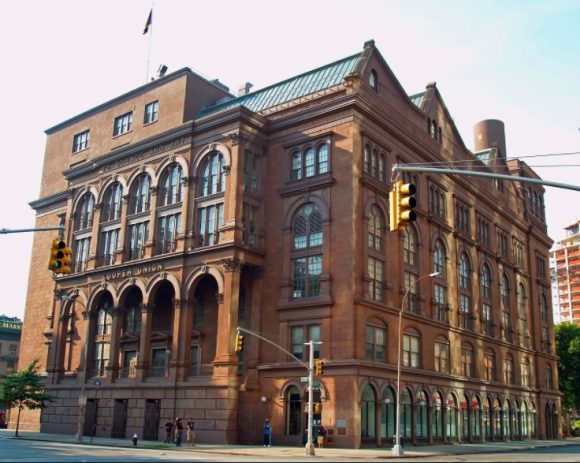Dear Commons Community,
Cooper Union, one of New York City’s venerable institutions of higher learning, announced on Thursday that it planned to restore its free tuition policy. After adopting a bitterly contested plan a few years ago to charge students tuition for the first time in a century, Cooper Union announced Thursday that it hoped to make the college tuition-free again for all undergraduates in 10 years. As reported by the New York Times:
“Under a plan approved by the board of trustees late Wednesday, Cooper Union would begin increasing tuition scholarships in two years, and aim to provide full tuition in 10. The additional outlay would be offset by unspecified cuts in expenses, more fund-raising and “other revenue increases necessary,” the college said in a statement.
“If we exceed the financial targets in any given year, we may be able to accelerate the plan; if we don’t meet the targets for any number of reasons, such as an economic downturn, we have built-in guardrails that allow us to slow the plan if necessary,” said Laura Sparks, Cooper Union’s president, who took office in January 2017.
The decision comes at a time when affordability has become an increasingly urgent issue in higher education, for both private and public institutions. The Excelsior Scholarship, rolled out by Gov. Andrew M. Cuomo last year, offers free tuition to middle-class students at the State University of New York and the City University of New York.
At Cooper Union, the decision promises to punctuate a brief, but tumultuous, experiment in the history of the prestigious private college, which opened in 1859. The industrialist Peter Cooper endowed the school to educate working-class New Yorkers at no cost to them. Early in the school’s history, some students who could afford to pay did so, but no undergraduates paid tuition for a century. That distinction made Cooper Union stand out, alongside the military academies, as one of only about a dozen colleges in the United States not to charge tuition.
But after years of questionable financial and management decisions, such as failing to diversify its endowment, taking on too much debt and failing to cultivate potential donors, the school, based in the East Village, announced in 2013 that it would begin to charge tuition on a sliding scale, up to 50 percent of the annual bill. That prompted protests from students, faculty and alumni, as well as a lawsuit by a coalition called The Committee to Save Cooper Union.
After the New York State attorney general, Eric T. Schneiderman, intervened, the two parties settled the lawsuit. Among the provisions was the departure of the president at the time, Jamshed Bharucha, and the appointing of a financial monitor.
Since the settlement, applications to Cooper Union have dipped. But with the school continuing to focus on its reputation for high-quality instruction, the number of enrolled students has held steady. “We’ve seen the admissions profile of our students stay the same, if not improve,” Ms. Sparks said.
Cooper Union has 853 undergraduate students, and admits 13 percent of applicants. Tuition was $43,250 this academic year.”
This is a great move by a fine institution!
Tony



Hello Admin,
It is very nice that your blog is providing information regarding the program. I want to aware you towards the “Top Universities to Study Biology in the U.S.”. In our list, you can discover the top-ranked universities for biological sciences, with the U.S. News & World Report rankings.
For more information you can go through –
https://www.helptostudy.com/top-universities-to-study-biology-in-the-u-s/
You can also join our Facebook page for the updates. The link
https://www.facebook.com/HelpToStudyAbroad/